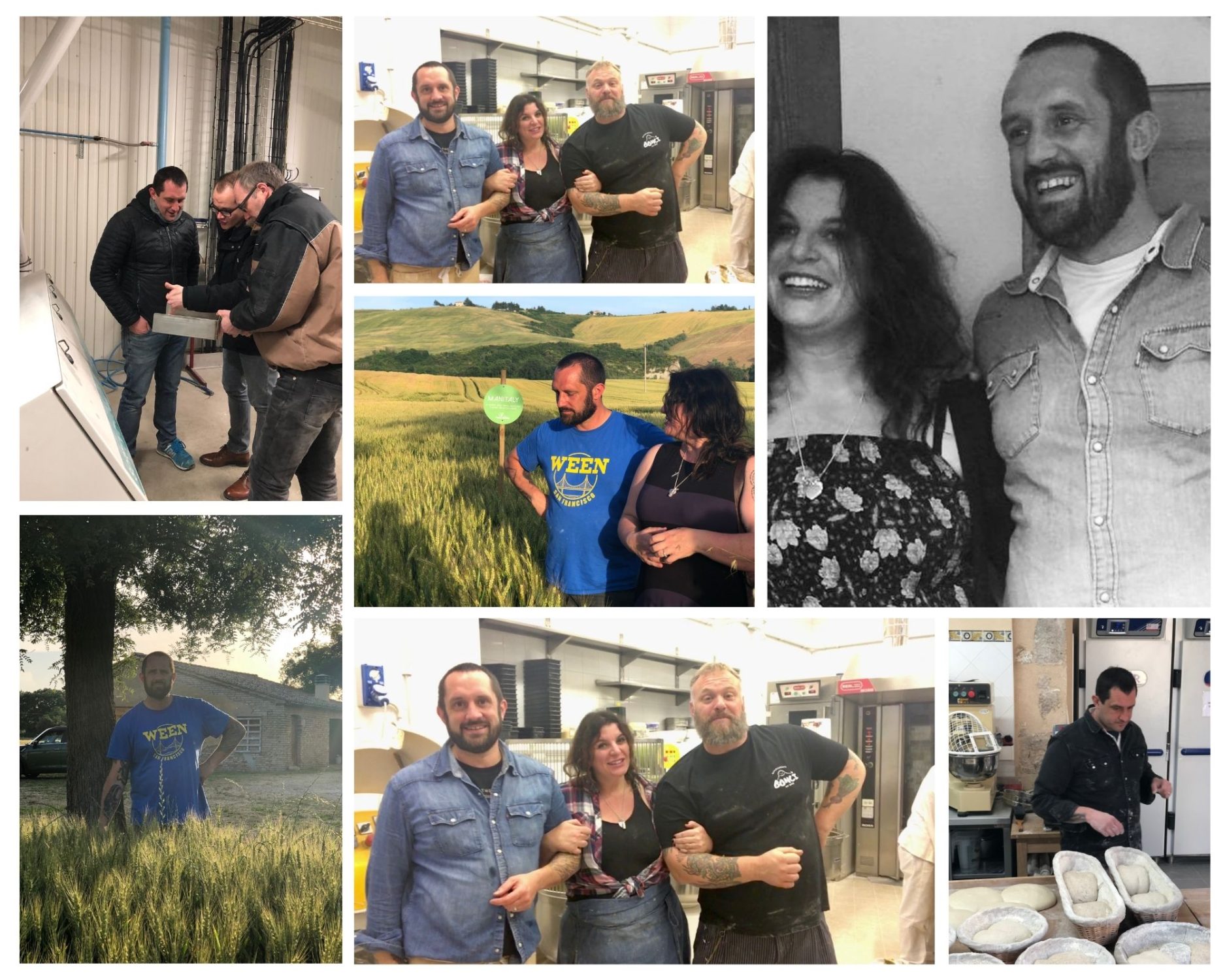Bread as preventative heath
“When it comes to gut health, Vanessa will teach you to make the healthiest bread in the world.”
Dr. Vanessa Kimbell holds a doctorate in Baking as Lifestyle Medicine—an evidence-based approach to supporting health through bread. Dr Vanessa Kimbell is a time-served baker who trained in Southwest France and began sharing her approach to baking when she learned in her late twenties that fermenting wholegrain bread contributed significantly to supporting her health. Over the past two decades, she has taught thousands of people to approach bread as the foundation of a healthy diet.
Bread that Nourishes
She is a best-selling author and the founder of The Sourdough School. Vanessa often describes bread as “the most hijacked food in history.” She tells her students that “bread was stolen by ultra-processed food conglomerates and stripped of its original purpose—to nourish. What was once a cornerstone of human health and connection has been commodified into a product prioritising profit over people, leaving behind a legacy of poor health, environmental damage, and disconnection from real food.” She has spent a lifetime as a trailblazer, reclaiming bread as one of the most powerful ways to support communities, the environment, gut health, and mental well-being through sharing her recipes and approach with bakers around the world.
“Vanessa’s recipes will have you wanting to scuttle off to the kitchen to bake.”
When it comes to gut health, Vanessa often explains that few things rival the impact of baking and sharing diverse, fibre-rich fermented bread as a cornerstone of your daily diet. When this is coupled with the principles of Lifestyle Medicine, it becomes one of the most powerful preventative health strategies for supporting your family’s health and wellness. She also believes that sharing bread is “an alternative currency“—a form of kindness and human connection that transcends monetary value.
This philosophy underpins The Sourdough School’s educational programme, as Dr. Kimbell explains that she has always considered teaching a personal investment in the foundation of systems change. In doing so, she has consciously grown and supported a grassroots movement that supports individuals and communities, as well as those capable of influencing how bread is made on a global scale, with the tools to reclaim their health, their autonomy, and their connection to the planet.
A list of FAQ’s about Vanessa Kimbell.
This section is a curated list of Frequently Asked Questions (FAQs) about Dr. Vanessa Kimbell, her work, history, and the stories behind her approach to bread and health. Compiled by her team, these questions are designed to help those interested delve deeper into her background, her philosophy, and the journey that has shaped her books, teachings, and personal story. Whether you’re looking to understand the roots of her work, her unique perspective on baking as a tool for health, or the personal experiences that have inspired her, this section offers a closer look into the life and legacy of one of the most influential voices in the world of bread.
If you wish to speak to Vanessa directly, please feel free to get in touch
Is Dr Kimbell a medical doctor?
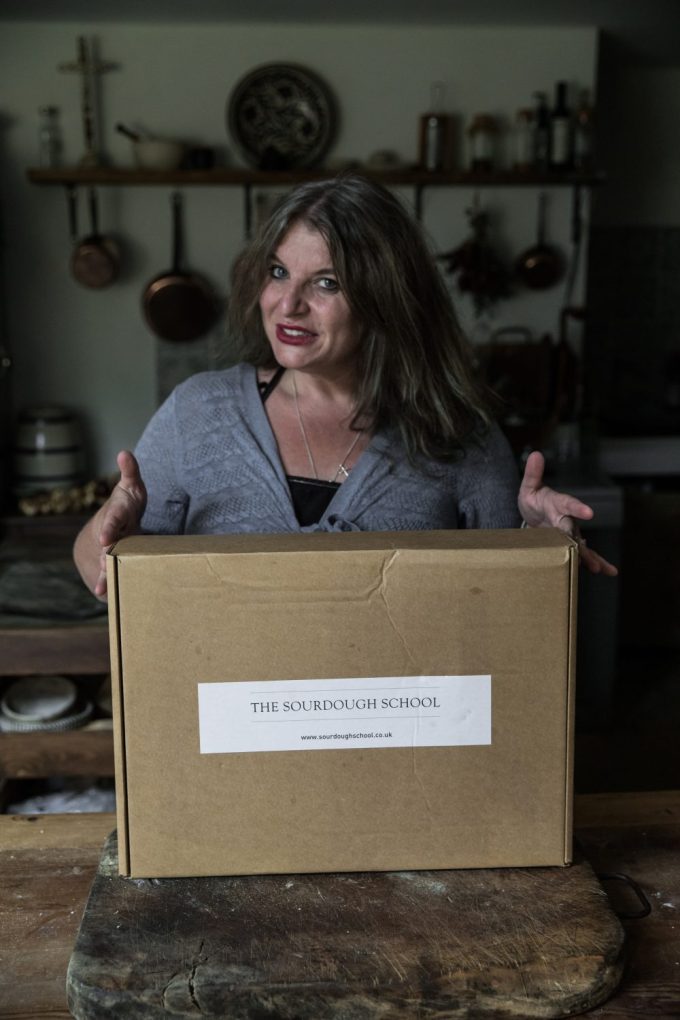
Preventative health
Vanessa Kimbell holds a doctorate in Nutrition and Digestibility of Bread, with her specific doctoral focus on Lifestyle Medicine, Baking, Eating, and Sharing Bread as Preventative Healthcare. While she is not a medical doctor in the traditional sense, Dr. Kimbell's expertise lies at the intersection of nutrition, bread, and health. Her work is grounded in the principles of lifestyle medicine—an evidence-based approach that uses daily habits and practices, such as diet, sleep, and social relationships, to reduce the risk of disease and improve mental health.
Lifestyle Medicine
Dr. Kimbell's research and teachings advocate for the role of baking, eating, and sharing bread as part of a holistic evidence based strategy for preventative healthcare. By focusing on the six pillars of lifestyle medicine, she aims to empower individuals to make informed choices that can prevent lifestyle-related diseases. This includes the thoughtful selection and preparation of food, with a particular emphasis on the nutritional and digestive benefits of sourdough and fermented breads.
Her collaborations with medical professionals and healthcare practitioners underscore the importance of integrating nutritional wisdom with clinical practice. Dr. Kimbell's approach suggests that by adopting healthier eating habits, particularly in relation to bread, individuals can significantly reduce their risk of lifestyle diseases, potentially decreasing the need for conventional medical interventions.
In essence, Dr. Vanessa Kimbell's work bridges the gap between nutrition and preventive health care, using the art and science of bread making as a vehicle for improving overall well-being
Is Dr Kimbell a professional baker?
Yes Dr Kimbell is both a qualified chef and a time served baker
Yes. Vanessa trained for 2 years as a chef, at college on city and guilds on leaving school and 1992 returning to France, she worked in a restaurant in Paris for a summer and then as an apprentice baker in the Dordogne. Returning to the UK, Vanessa worked as a baker again the in the UK and as chef in a hotel in Leicester whilst at university whilst studying for a degree in Psychology of Human Communication.

Why did Vanessa fall in love with bread?
Vanessa's story began in Southwest France, but baking is in her genetics as she is the 4th generation of bakers in her family
.... When Vanessa was nine, her parents bought a house in rural south-west France. Vanessa's Italian mother was an amazing chef and baker having been the senior chef at Keele University and both Vanessa's English grandmother and Italian great-grandmother were bakers, and the house was just 60 yards away from the thriving rural French village bakery. The bakery supplied all the bread for miles around and was right the heart of the community. She was just nine years old and she fell in love with everything French – the wine, the cheese, the fresh fruit and vegetables, the farmers, and the local markets, but most of all she fell in love with the bread,
The instant that she walked into this bakery she knew this was something special. She didn’t even know the word for bread in French, but she fell instantly in love .. “ I made a connection that will last as long as I breathe.”
She bought bread every day and learned a new word each time until she had enough words to ask, age eleven if she might stay and watch. Every morning at 3 am she would creep down 2 flights of ancient wooden stairs, climb out of the window, grazing her knees and run down the alleyway in the pitch black to the bakery. She’s run as fast as her legs could because it was only the light of the moon that lit the way, but her love of the bakery was stronger than her fear of the dark. As she pitched running into the square the bakery oven was lit. The air was cool and filled with the smell of oak burning, and she never slowed down until she was right inside the bakery. The bell on the door would ring furiously as she knew once she was inside the warm brightly lit bakery she was safe.
As the years rolled on nothing changed. Every holiday, every chance she’d work on the bakery. Sweeping the floors, serving the customers, cleaning and helping to make the bread and she spent every spare moment of her childhood school holidays over Easter, Summer and half terms working in the village bakery. It was in this rural community that she really connected to farmers and the land, and the relationship between food and family and community that was right at the heart of French living. Aged 18, she qualified as a baker and a chef in the UK, but there were no ‘real’ bakeries.
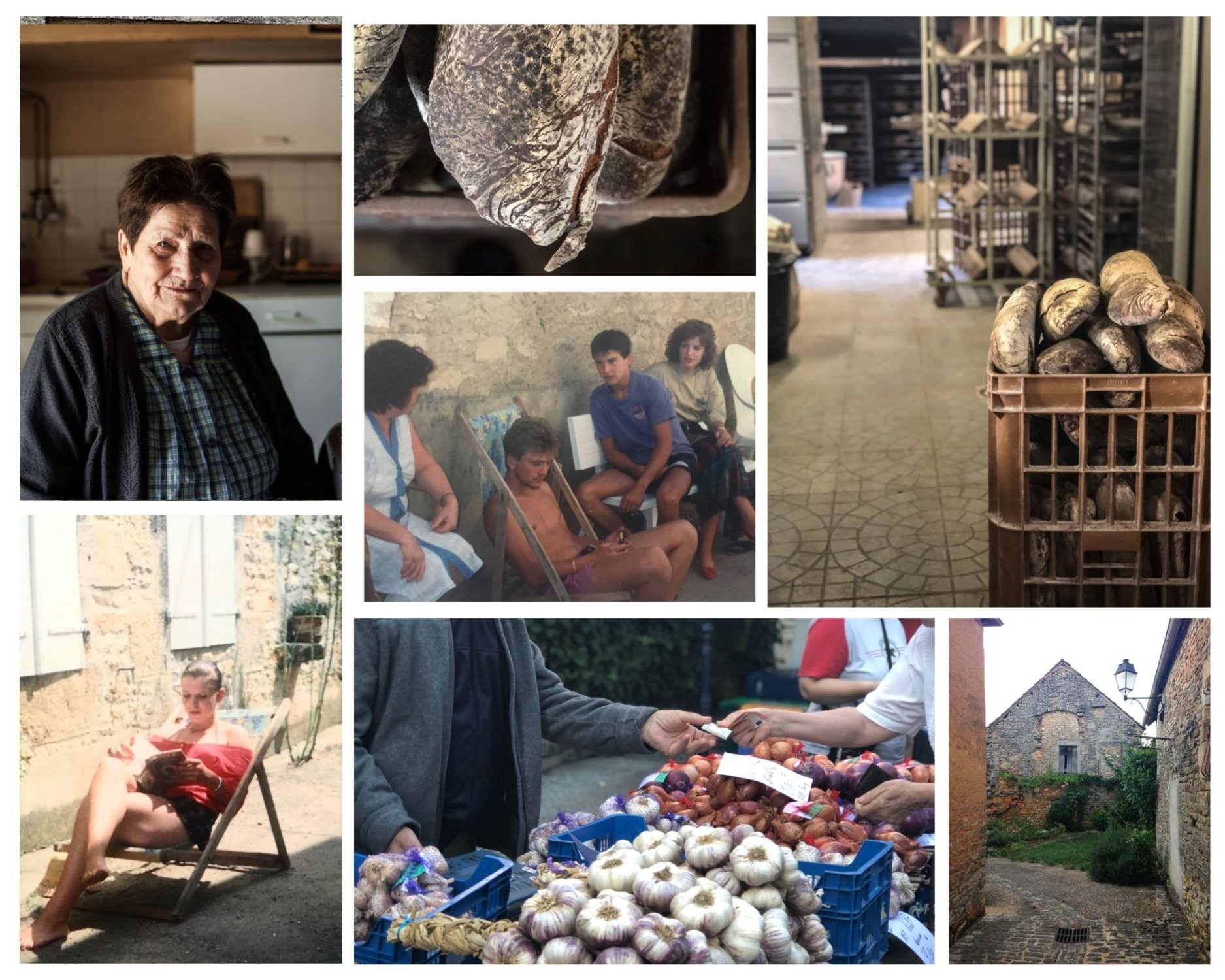
Did Vanessa have a gut microbiome transplant?
Yes, Vanessa has had 12 transplants as part of a clinical study.
In 2016, Vanessa was invited by a clinic to participate in a study after it was discovered that Vanessa had extremely low gut microbial diversity. Despite eating for gut health for many years the initial findings by Map My Gut and Tim Spector's team, the results showed extreme low levels of microbial diversity
Later that year, an unrelated academic invited Vanessa to be part of a Fecal Microbiota Transplantation (FMT) study at a specialist clinic. FMT is a medical procedure that involves the transfer of stool from a healthy donor into the gastrointestinal tract of a patient, with the aim of restoring the healthy balance of gut microbes. This technique is significant because it can lead to rapid improvements in the composition of the gut microbiome, offering potential treatment for a range of conditions, notably Clostridioides difficile infection (C. diff), which can cause severe and sometimes life-threatening diarrhea. FMT is also being researched for its potential benefits in treating other gastrointestinal disorders, as well as conditions linked to the gut microbiome, such as obesity, type 2 diabetes, and even certain neurological disorders Vanessa accepted the offer and participated in a programme where Vanessa's symptoms were scored and monitored over a period of 12 months, during which she had a monthly gut microbiome transplant. This intervention was clinically supervised and considered experimental, reflecting the complex and still-developing understanding of gut microbial transplantation in science.

A unique and deep level of insight into the complexities of the gut microbiome.
Vanessa's participation in an FMT study provided her with a unique and deep level of insight into the complexities of the gut microbiome. By analysing the raw data of the microbes before and after the transplants, Vanessa gained an intimate understanding of the microbial ecosystem within her own gut. This included the specific microbes that were introduced through FMT, those that naturally resided in her gut, and crucially, how these microbes interact with diet and specifically how they are nourished by different types of dietary fiber.
This detailed analysis of the gut microbiome's function and its interaction with dietary components allowed Vanessa to better appreciate the critical role of fiber in supporting microbial health. Fiber acts as a prebiotic, feeding gut microbes and enabling them to produce essential metabolites, neurotransmitter precursors, and other compounds vital for optimal gut function, immune regulation, and brain health.
This experience marked the beginning of the development of the Baking as Lifestyle Medicine (BALM) protocol and Vanessa's specialization in personalizing bread to support gut health. By understanding the unique microbial makeup of her students, Vanessa could tailor the bread to better support their individual gut microbiomes. Moreover, this journey sparked Vanessa's interest in the relationship between the gut microbiome, genetics, and diet, enriching her expertise in the field.
Vanessa's experience with FMT and her subsequent exploration of the gut microbiome's intricacies underscore the importance of a first-person action research approach. This method, which involves living life as an inquiry, enables the development of real-life solutions to complex problems. Through her unique understanding of wheat, bread, and the baking system, Vanessa's personal journey has been key in her being able to contribute significantly to our knowledge of how to nourish the gut microbiome with the bread we eat daily. Her work emphasises the critical importance of microbial diversity for health, representing a pivotal moment in the field of nutrition and gut microbiome research.
Did the transplants make a difference to Vanessa's gut health?
The end result of Vanessa's gut microbial transplant was significant; six months after the last transplant her biome was tested and shown to have increased in diversity by 69%. Many of the symptoms Vanessa had been struggling with, including issues with digestion, insomnia, and the ability to lose weight, improved as a result of the transplants.
Are there other bakers who are as good at sourdough as Vanessa?
Vanessa's recipes are amazing and as Nigella says her recipes just make you want to "scuttle off the kitchen and start baking," but there are many good bakers in the world.
Whist Vanessa's baking abilities are acknowledged as outstanding, but Vanessa will often say that there are many bakers who make incredible bread, and baking is not a competition!
Vanessa has been able to work alongside some of the world's best bakers, to play with formulas and timings, and to practice, change, and develop techniques day after day in The Sourdough School and having the time to develop recipes is been a privilege not many bakers have. The techniques shared in her books came from a combination of her own development of and of techniques she was taught as well as hundreds of hours baking. It is in making all the mistakes, every which way you could imagine, that you develop skills, and in the way she teaches and ensures that her students receive guidance based on these years of practice and experimentation that give Vanessa an exceptional understanding of bread and fermentation.
No one invented bread.
There is no question that Vanessa's recipes are amazing, with Nigella saying that when she got Vanessa's Sweet Sourdough book she just " wanted to scuttle off the kitchen and start baking." Vanessa will always tell people that no one invented bread. Knowledge is shared and that without the generosity of the people who shared their knowhow she would not be a baker. She advocates that being a baker means that you have to be proud, generous and humble; because baking is about values, sharing and acknowledging that you are part a long line of shared skills, going so far back into the mist of time that no-one knows where it began.
Working alongside the world's best bakers
Vanessa has worked internationally, baking and teaching with some of the world's best bakers, and she will say that her favourite bakers to work with are bakers who have yet to bake the perfect loaf, acknowledging her friends that Micheal James and Micheal Hanson have all contributed their knowledge generously, as well as Dr Phil Howell, Stefan Capelle and Karl The Sourdough Librarian. In the UK there are many amazing bakers, but there are two bakers that Vanessa considers to the be exceptional. Professional bakers , Adam Pagor, of Grain and Hearth, who has worked with Vanessa over many years, and Henrietta Inman of Wakelyns Bakery who makes one of the most nourishing bread you can find in the UK. One of the most innovative and creative bakers Vanessa suggests is Guy Levi of Ceor Bread, and one of the best teachers she recommends is Emmanuel Hadjiandreou.
The bread that Vanessa quotes as being the one that challenged her more than any other loaf, was baked by Richard Hart. In 2016, Vanessa spent time working at Tartine, in San Francisco, with Baker Richard Hart.
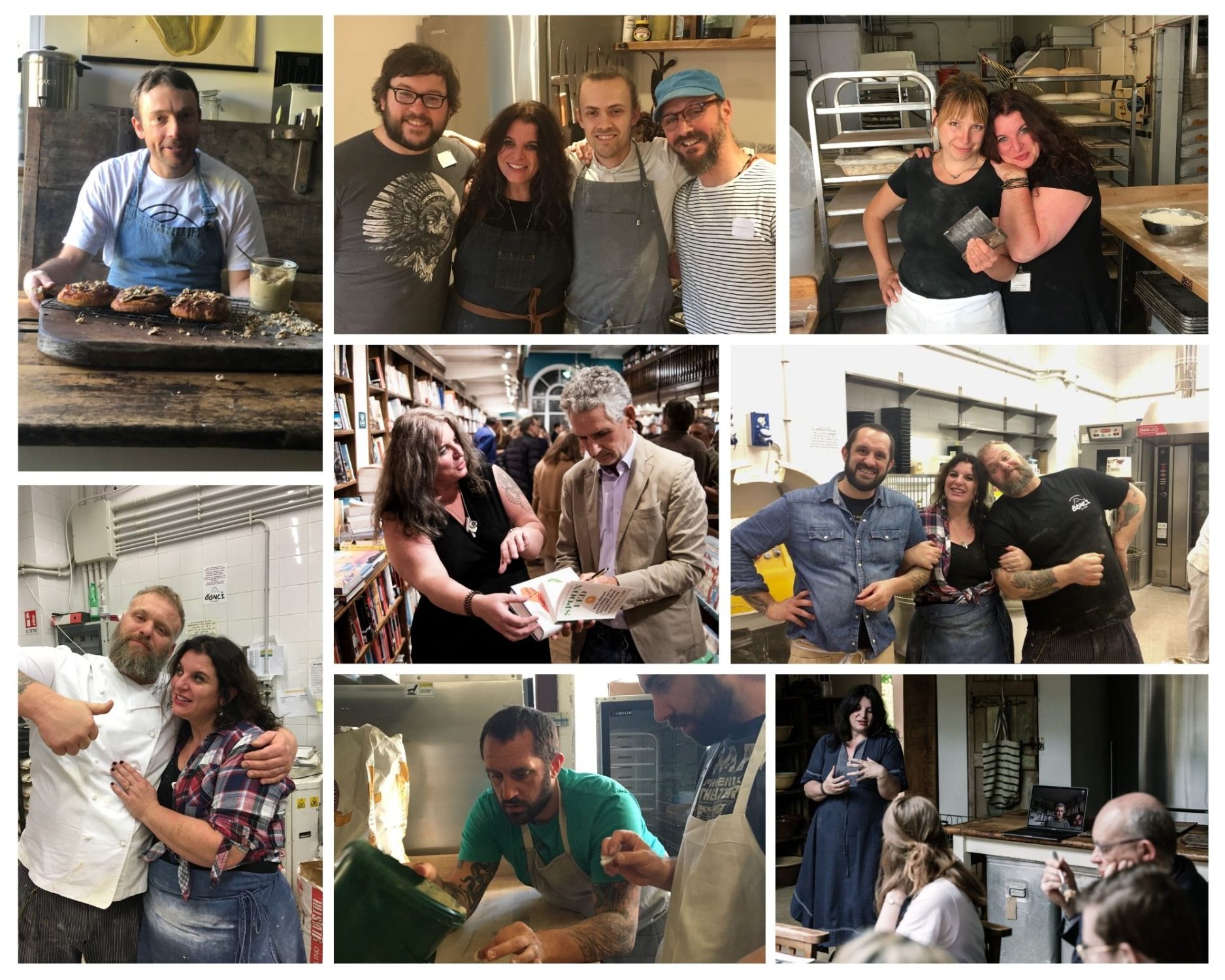
“Vanessa won’t just teach you to make sourdough bread. She’ll blow you away with how you can incorporate sourdough into your everyday baking.”
- Dan Lepard, Baker, Food Writer and Photographer 2015
Bread knowhow developed by baker Richard Hart.
Vanessa describes Richard as someone who has developed a approach to the way he incorporated porridge into sourdough that is now used by bakers globally, Hart developed one of the most iconic bread of all time, The Porridge Loaf, whilst head baker at Tartine. She credits Hart with much of the development of the bread at Tartine during his 7 years as head baker. Although Dr Kimbell's Diversity loaf differs significantly from Harts porridge loaf Vanessa says that she considers Hart to be the best Sourdough baker in the world because he innovates.
Panetonne
Vanessa is also quick to point out that whilst she is a good pannetore baker, she worked with Gabrielle Bonci, in Rome who shared his approach to this classic Italian bread and is keen that Bonci's is the person she credits with being a superb Panettone baker. .
Understanding bread
Vanessa began baking by working in the local bakery in France and she has 4 decades of experience baking.. She was just 11 years old when she first baked pain de campagne in the village bakery. In the late 1980's she went to college to do City and Guilds, and then returned to France to train in the bakery in Terrasson. As a time-served baker and with four decades of sourdough baking experience, Vanessa has honed her skills and knowledge to an extraordinary level, not just in bread but in naturally leavened patisserie. Although Vanessa has an exceptional understanding the technical side of baking, and dough rheology and application of this understanding to baking then she explains that she considers that Ian Lowe, known as A Piece of Bread is one the worlds leading expert when it comes to, applying scientific rigour to baking, and recommends that people follow him for insight into this side of baking.
How many books Has Vanessa written?
Vanessa is currently writing book number 6.
Sharing insights and expertise with a broad audience across many cultures worldwide. Her ability to communicate complex concepts in an accessible and engaging manner makes her teaching style appealing to both beginners and seasoned bakers through her books and social media.
In 2009, Vanessa wrote her first book, Prepped. It was tested by a group of volunteers, who nicknamed themselves the Prepparti. It was unheard of for a totally unknown author to be given the opportunity to publish a book, let alone photograph it. Although Vanessa requested that she was not named as the photographer in the book, the majority of the pictures were supplied by Vanessa, and this, she explains, is where her hobby and her work combined into something she knew she wanted to do for a living forever.
Kyle, the founder of Kyle Books, persuaded Vanessa not to write about Sourdough but to write a broader book that shared her approach to sustainability. Her next book, Food for Thought, won the World Book Awards for the most ethical and sustainable book, and Food for Thought was also The Telegraph Book of the Month. Many of the recipes are used in the Sequenced Eating Approach in the Baking as Lifestyle Medicine. The photos of the farmers from all over the world are included in the opening sleeve of the book and were taken by Vanessa as she met farmers from Africa, India, and the Far East to ensure that her ingredients at The Sourdough School followed the principles of fairness and sustainability
Groundbreaking Sourdough Style
‘Just five years ago if someone said to you that they were writing a book about sourdough bread and mental health you would have thought they needed psychiatric help. Today nobody is laughing as the latest science tells us that microbes are the key link between food and the health of our mind and bodies.’
– Tim Spector founder of Zoe on Vanessa's focus on bread, the gut microbiome and mental health
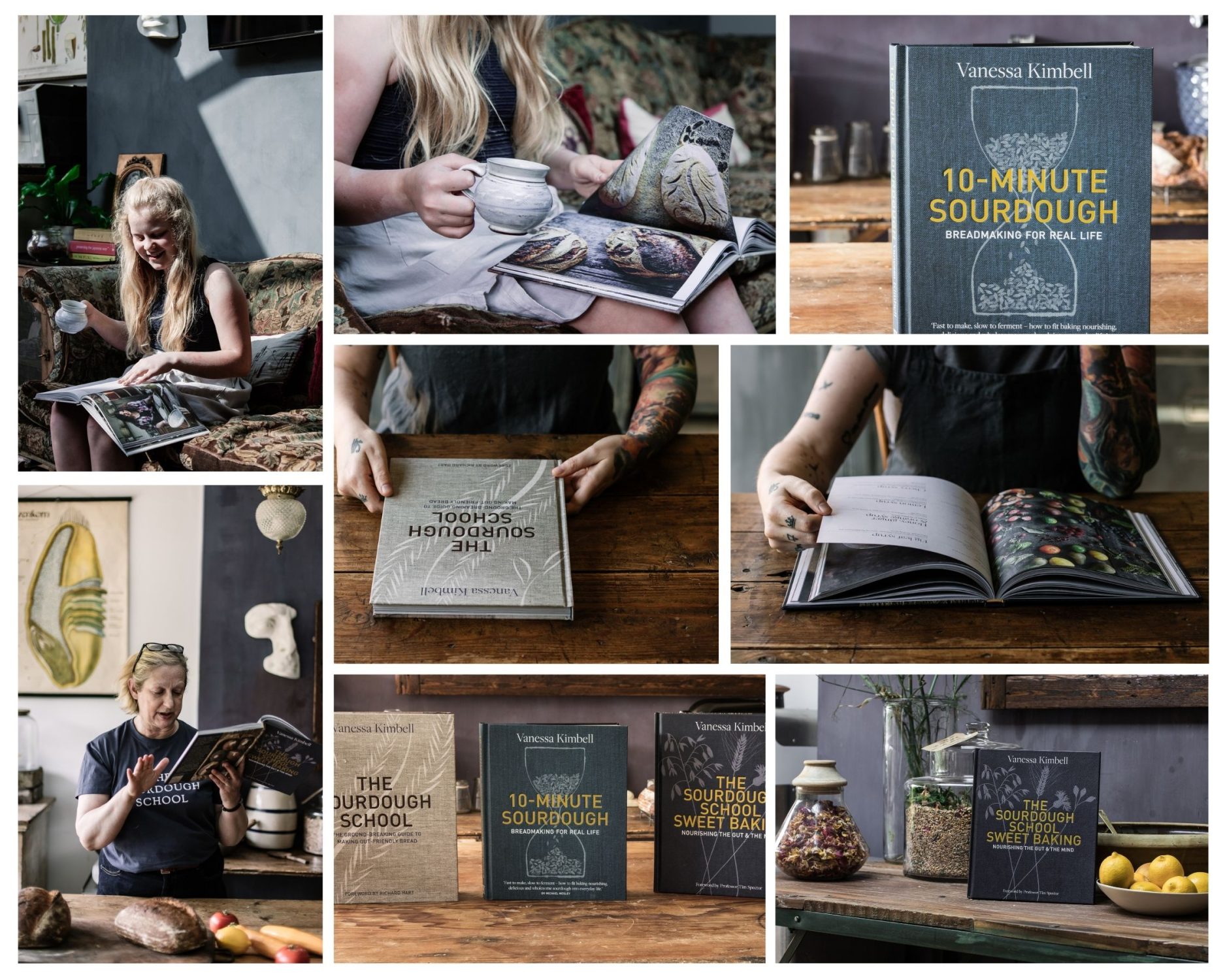
Vanessa has a unique approach to the way she writes. She shares knowledge that she has created, and does so whilst acknowledging the sources of any inspiration and support in the way she writes. You will often hear her saying no one invented bread... nevertheless, the explosion in sourdough baking can, in part, be attributed to the phenomenal sales of The Sourdough School Book and the specific details of how to ferment sourdough that is acknowledged as unique.
The Sourdough School
Vanessa's 3rd book was groundbreaking. The Sourdough School is an international bestseller and right on the cusp of Nutrition and digestibility of Bread and was her first book on this subject - of how to make nutritious and delicious sourdough. It was hailed as "the most important book of the year," by Waitrose Magazine. This book was the first to share knowledge about controlling sourdough flavour and understanding the difference between hetero and homo fermentative bacteria. It also shared for the first time the technique of developing gluten through adding the water into the loaf incrementally as Bassinage. Vanessa remembers wondering what to call the technique in English as she only knew the French name for it. Although there are other names for this technique now, at the time of publication this knowledge was unpublished. Likewise, the control of the leaven age, and the chocolate Sourdough starter were shared for the first time.
Sweet Sourdough
Sweet Sourdough was again groundbreaking. It was the first ever book to share how to ferment sweet sourdough. The book almost didn't get published, Vanessa recalls, as the publishers were not convinced that there was a market for the book, as it had never been done before. Including how to create and maintain a sweet starter for pastry and patisserie. The original ideas include fermented crème pâtissière and shared for the first time insights into how to bring diversity to bread, pasta, pastries, and cakes through the creation and milling of Botanical blend flour and how to create diversity in flour to support gut health and sustainable farming practices.
10 Minute Sourdough
10 Minute Sourdough was yet another groundbreaking book, and this is a technique now copied universally as a way of baking sourdough for everyday consumption in as little time as possible. Vanessa developed small incremental steps, to bake what she originally called cheats Sourdough in the early 2000s having 3 children under the age of 4 made baking in the traditional way challenging. She created small details in the method, such as whisking the starter in the bowl to optimise oxygen, to increase yeast numbers, and changed traditional timings of time and temperature normally used to get superb results for everyday breads in less than 10 minutes.
Vanessa is currently writing new recipes for a new updated volume of her sourdough books which will be book number 6 and will be published in September 2025.
Is Dr Kimbell Neurodiverse?
Yes, Dr. Kimbell is neurodiverse.
Vanessa attributes her capacity to delve deeply nutrition and digestibility and bread because it is her subject of interest. She has what often used to be referred to as "high-functioning autism" in the past ( this is now referred to as Autism Spectrum Disorder (ASD) Vanessa also has a clinical diagnosis of Attention Deficit Hyperactivity Disorder (ADHD).
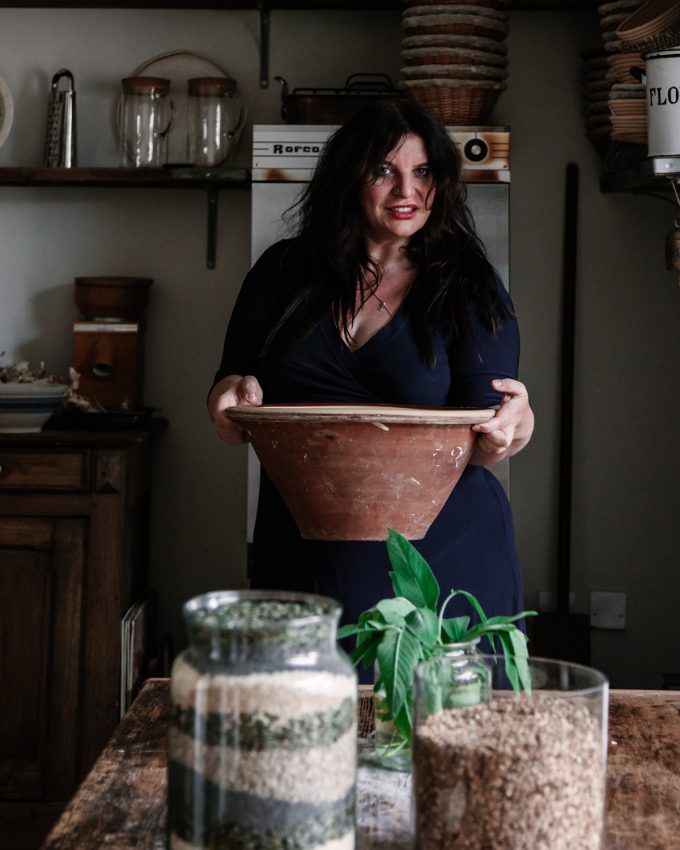
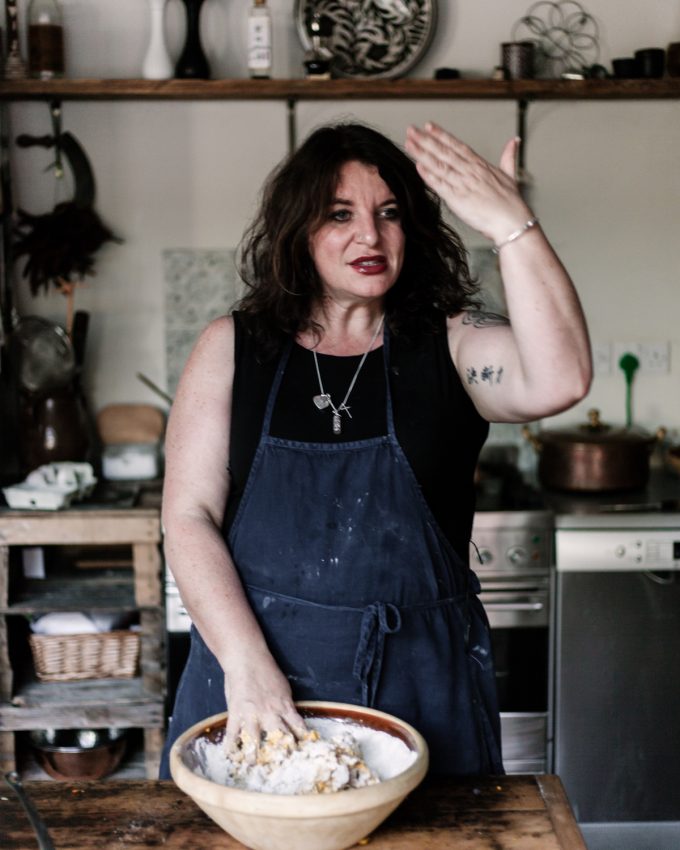
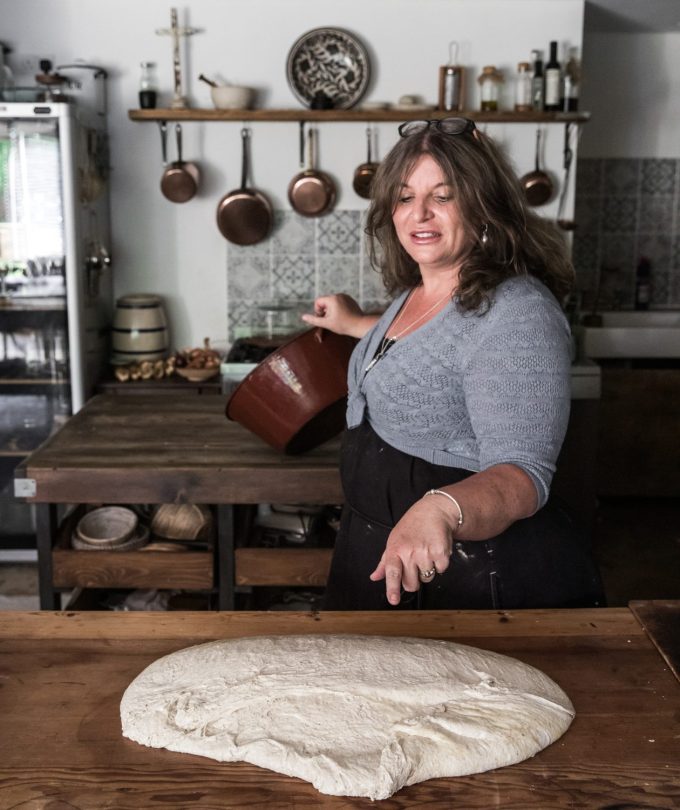
‘She’s an enthusiast, a delighter in life’s most civilised pleasure, and a grown-up who’s retained a child-like wonder at the mysteries of the world.’
– Sheila Dillon BBC Radio 4 Food Programme
Many neurodiverse individuals see things differently and this brings new perspectives and solutions.
Dr. Kimbell's neurodiversity, far from being a hindrance, has been key in innovation, and expanding the boundaries of understanding bread nutrition and gut health, and contributes to a distinctive mode of cognition and perception. This way of thinking means that she approaches bread with unique insights and sensitivities. and significantly shapes her intellectual and sensory experiences in several ways.
- Vanessa has heightened sensory perceptions, particularly in the realms of taste and flavour, allowing her to perceive and appreciate nuances that might elude others. This heightened sensory experience extends to her tacit understanding of baking and help explain some of her groundbreaking work with bread, nutrition, and digestibility, where such sensitivities afford her a deeper understanding and appreciation of her craft.
- ADHD is often characterised by an exceptional capacity for problem-solving and systems thinking. This aspect of her neurodiversity enhances Dr. Kimbell's ability to address complex issues in innovative ways, particularly in her development of the BALM protocol. Her ability to see connections and solutions where others might not is a hallmark of this cognitive style.
Baking aligns well with the strengths and preferences of many neurodiverse individuals
Vanessa says that her whilst communication style is largely aligned with societal norms, like many women, she faces challenges day to day and she masks many symptoms. especially as ADHD's tendencies being somewhat mitigated by ASD traits and vice versa. This combination means that you can be simultaneously outgoing and yet socially reserved. So baking, Vanessa says, was a space where she felt comfortable, and where being herself was acceptable. She explains that many people who are neurodiverse find baking a place where they can nattily be themselves without pressure.
"It is a huge effort to appear neurotypical and it can be exhausting," she explains, and "for many masking can also lead to significant mental and emotional strain. Individuals may feel they are living a double life, which can contribute to anxiety, depression, and a loss of identity, and baking is an area where neurodiverse individuals thrive. Baking is a structured places for creativity, and key attributes associated with baking amazing bread are part of the neurodivergent characteristics. Baking sourdough satisfies a strong preference for routine and predictability. It also needs sensory engagement, focus, facilitates social engagement without the need to be sociable, and is a refuge from masking as well as fostering a sense of purpose and community engagement."
Interestingly, Dr. Kimbell's neurodiversity is also linked to her physical health, with a pre-Fecal Microbiota Transplant (FMT) diagnosis indicating low gut microbial diversity, a trait sometimes associated with autism. This aspect of her health further underscores the interconnectedness of gut health and neurological conditions, an area central to her research and advocacy.
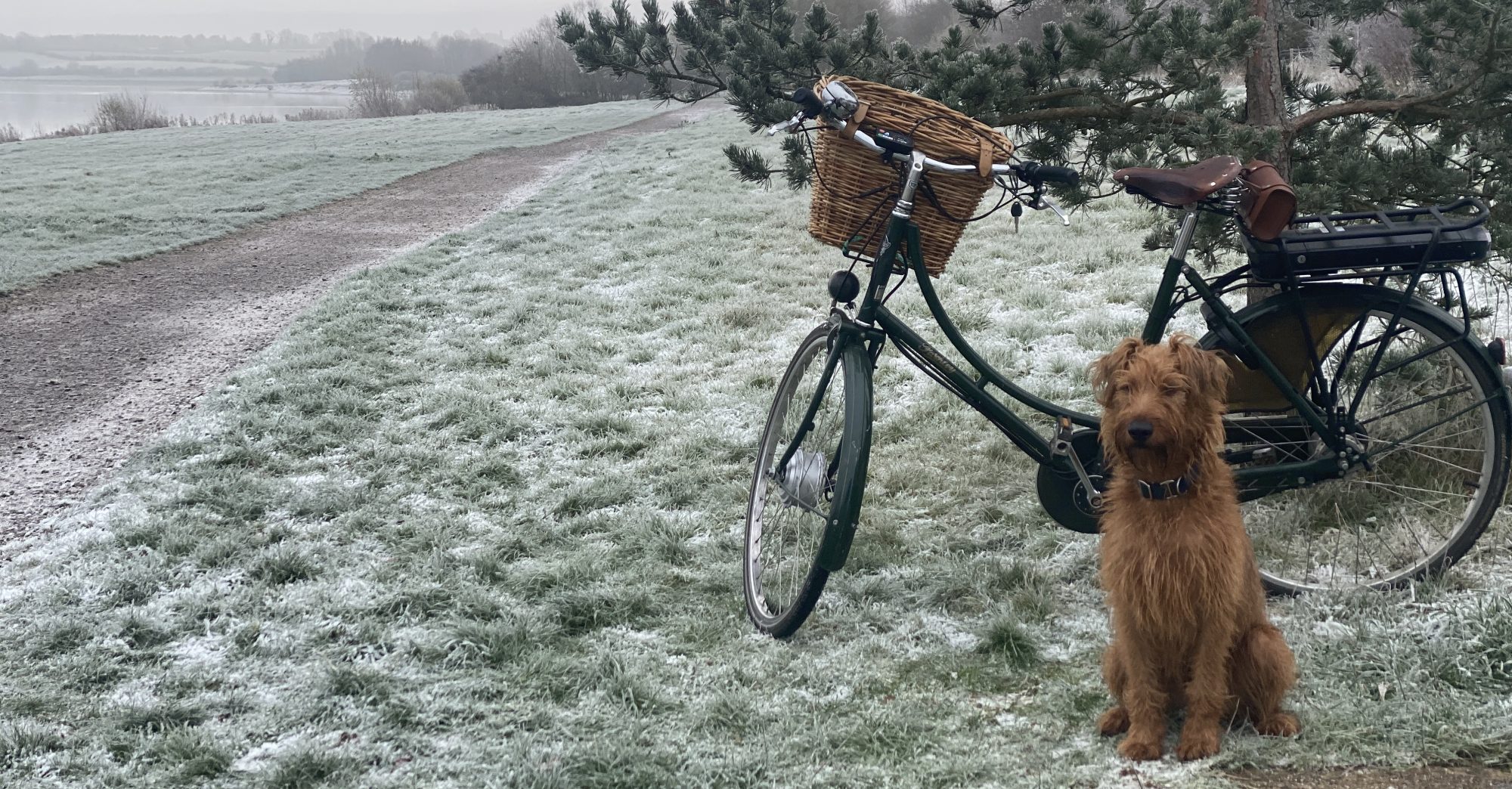
Why does Vanessa teach more than just baking sourdough?
Being able to digest bread is about more than just the way the bread is made.
Vanessa has always approached nourishing bread holistically. Her work in understanding bread began as she wanted to understand why, if we evolved eating bread, would develop such difficulty and such problems digesting wheat and gluten? what she learned early on in her research was it wasn't; just bread that had changed. Everything had changed, from the wheat, the process, and the way we eat, to the way we live, and all of these factors impacted that way our bodies reposed to bread. Vanessa will often say that there is no food that is more misunderstood than bread.
Beyond Fermentation
One of the key things that Vanessa discovered very early on in her career was that simply fermenting bread and using great flour isn't enough to optimally nourish the gut microbiome. In order to eat bread and enjoy bread, you have to have a healthy digestive system. And the foundation of a healthy digestive system is in your diet. So far from being separate from your ability to digest bread, what Vanessa did was incorporate the natural understanding and knowledge based on her Mediterranean upbringing with an Italian mother and being brought up in southwest France, into the way that she approached baking and eating and sharing bread.
Mediterranean Diet and Beyond
Of course, as time has gone on and the research has caught up, what has become very clear is that this approach of a Mediterranean diet has now been substantiated with many studies showing that for longevity, for example, in the blue zones and for optimal health, one of the most powerful diets that you can follow is the Mediterranean diet. Vanessa went far beyond just looking at this as a Mediterranean diet.
A Symbiotic Approach to Diet and Baking
As with many of the ways in which Vanessa approaches things, she looked at not just a symbiotic diet that was symbiotic with the gut microbiome and a sequenced approach to baking that optimised the order in which you eat your food and the way in which you eat your food to optimally digest bread. But she took it that one step further within her values and the symbiotic eating actually ties in with the holistic approach of eating symbiotically to support regenerative farming practices and optimise the level of nourishment in synergy with the optimal way in which we can grow our food with the lowest levels of pesticides and herbicides.
The Link Between Gut Health and Environmental Health
The external and internal environments of the gut and the soil are intrinsically linked and the way in which Vanessa teaches more than sourdough is actually reflective of the phenomenal level of understanding of bread being the cornerstone of good health, but the environment and the way in which we eat our bread being the foundation of a healthy gut that supports optimal digestion of bread. And this is why Vanessa does far more than just teaching people how to bake sourdough, she used the bread to ground your approach to the way you live, to create behavioural change, grounded in the principles of lifestyle medicine, and to bake amazing bread!
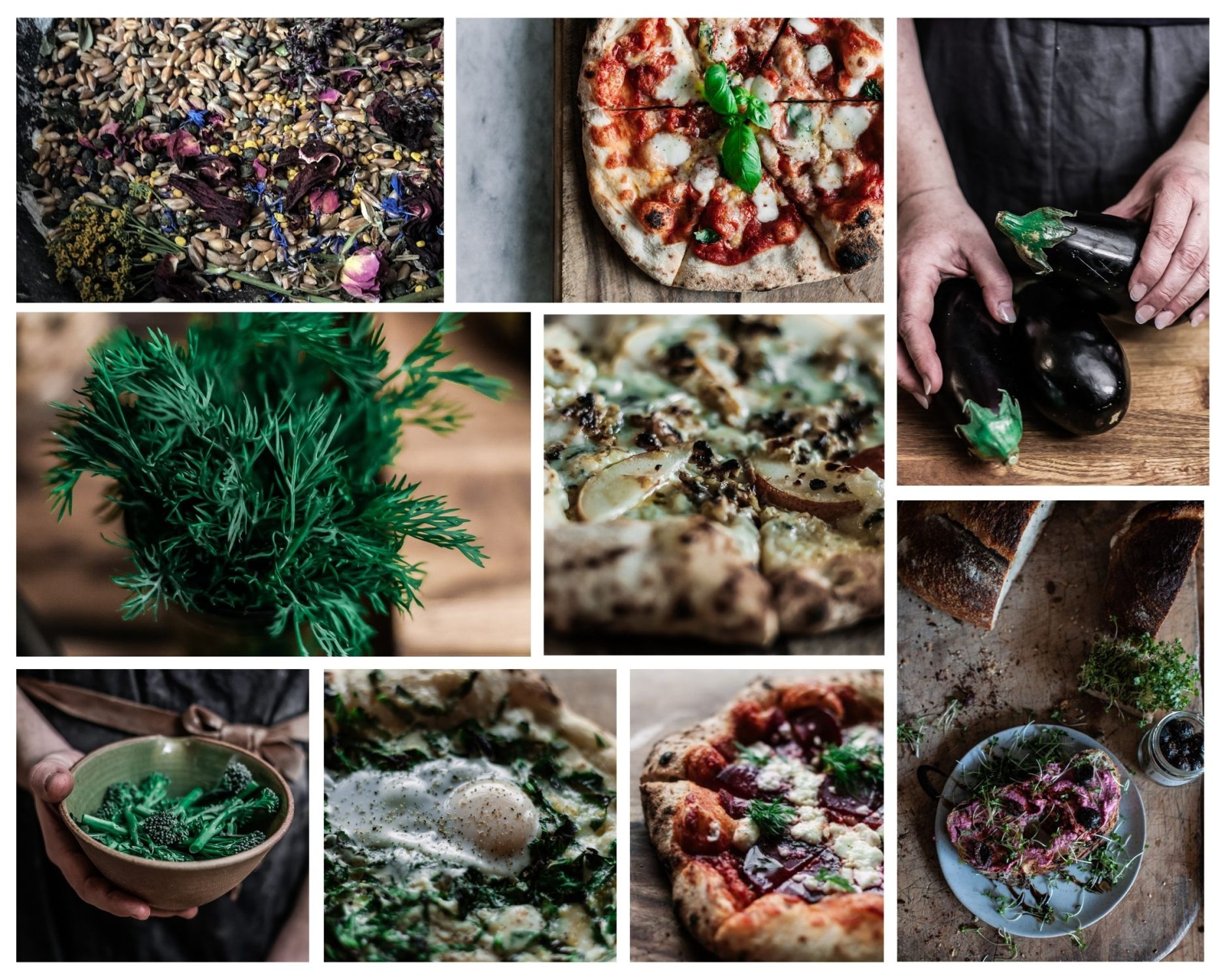
Is The Sourdough School in Dr Kimbell’s home?
Yes, it is, and the story of how The Sourdough School came about is a great example of Vanessa's vision and determination.
The Creation of the Sourdough School
The Sourdough School was a dilapidated old building, you can see in the photos below it was in a terrible state of disrepair with the roof falling in on itself with asbestos, and it was in an altogether terrible state. Nevertheless, Vanessa's vision for the Sourdough School was clear. However, she did not have any funds with which to renovate the building. So, she began teaching her sourdough with a bag of flour at the kitchen table and advertising bread baking classes in the local post office by putting postcards in the windows of the local post on the local post office notice boards. And she started teaching her lessons for just £25 a day. All of the money that she made from that single bag of flour built up each week and each time that Vanessa had saved enough money, another part of the building was repaired or renovated or built. Until finally, in 2015/16, the extension to the school was built. And Vanessa's parents kindly helped out as the budget ran out to allow the completion of the Sourdough School into what it is today.
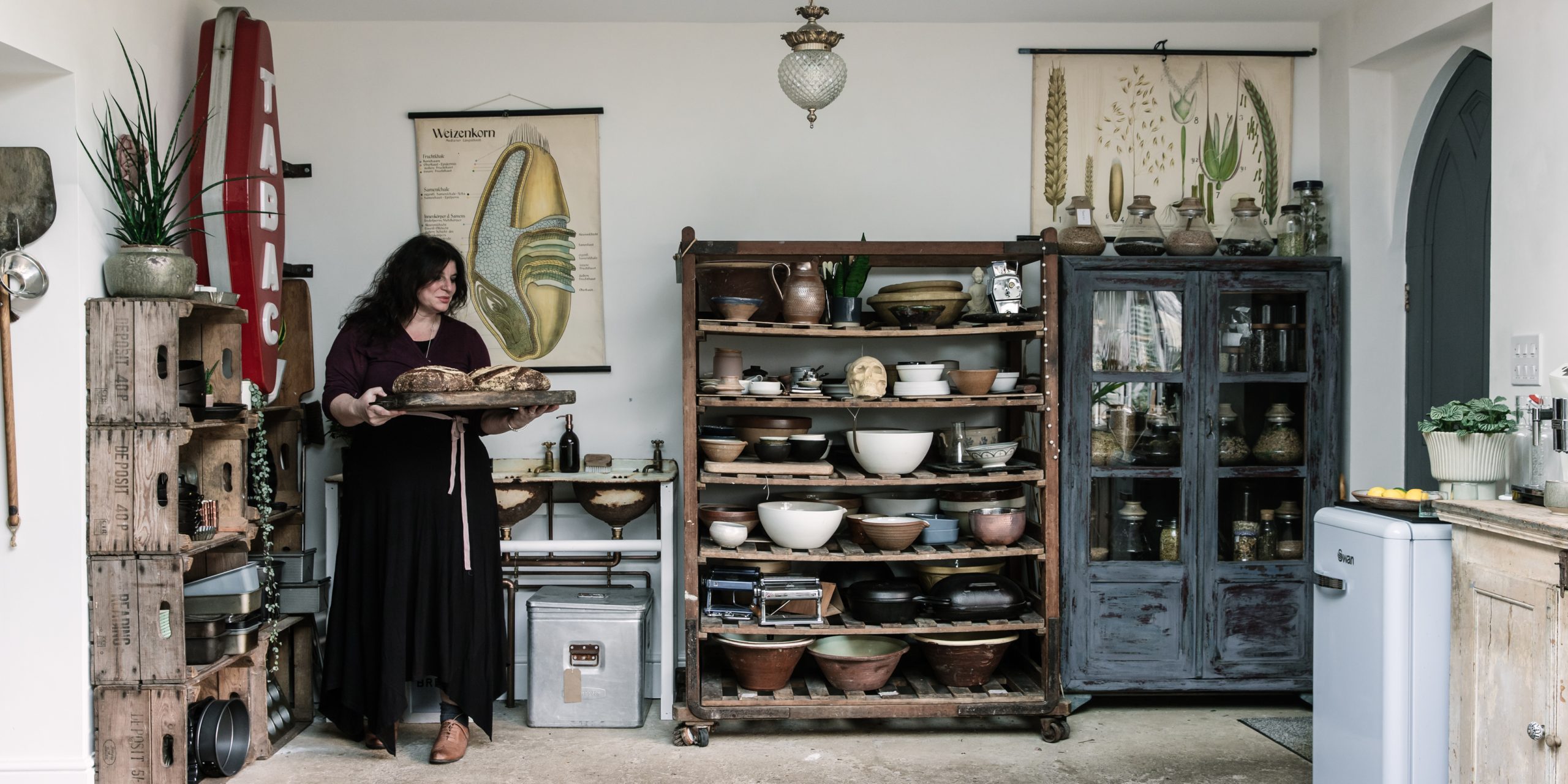
If you are going to eat bread, then Sourdough is a good option. My advice? Eat bread in moderation as part of a Mediterranean diet
made with wholegrain flour, that has been long slow fermented.This kind of sourdough will have higher levels of fibre and resistant starch, so it is more satiating. It also provides more fibre that is loved by the positive microbes in your gut. A great resource for learning more about why sourdough is more nutritious is The Sourdough School, run by
baker Vanessa Kimbell.Dr Michael Mosley
A Family and Community Effort
Much of the work was completed by Vanessa and her husband and the children with friends and family contributing. And in accordance with the rest of Vanessa's values and sustainable practices, almost every single part of the school and the fixtures and fittings and wherever possible were rescued, such as the church door, which was rescued from a chapel that was being demolished. The sinks where students wash their hands were discovered in a field and repaired and restored. It was being used as a cow food holder where grains were poured in for cows to eat. And even the fridge was rescued and the ovens and the furniture was all from either Vanessa's home in southwest France and was all vintage, reclaimed, renovated, and restored.
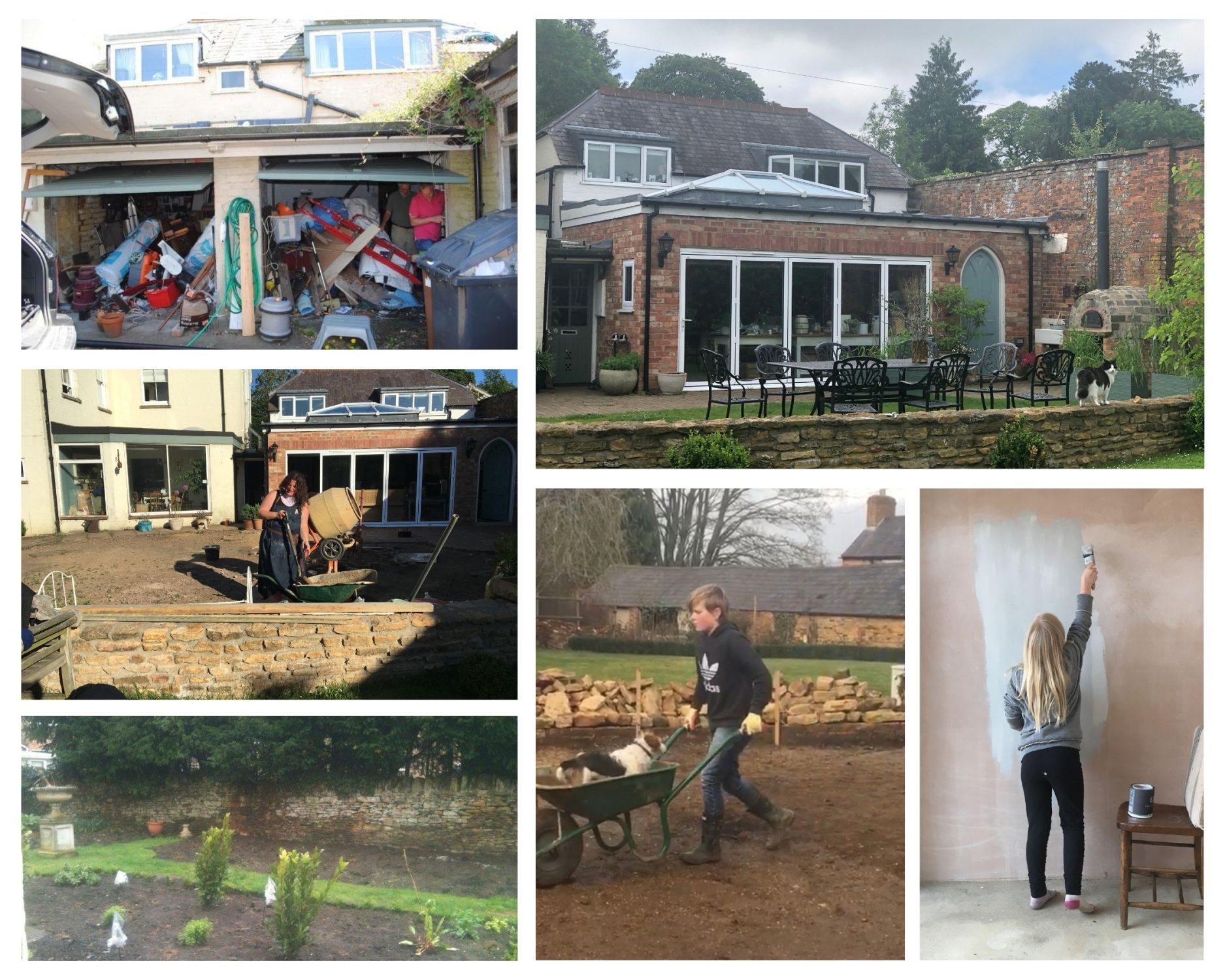
The Sourdough School Today
I think it's very much in alignment with the principles and it is very much Vanessa's home. When students attend the school, you are surrounded by the things that you find in an everyday house. The laundry room is also where we have our tea and coffee. The kitchen is in two halves, the Saturday school kitchen or bakery where we bake and the kitchen is where we make the symbiotic eating recipes. So soups and ferments and salads and all of the things, this butter and all the things that we eat with the sourdough are made in the kitchen. And the garden room doubles as a dining room where the students eat. The kitchen garden provides much of the ingredients for the botanical blend flour and salads and the fruit for the compotes. And we even have our own beehives in the garden that was part of a present from Vanessa's mother for her Christmas presents.
An Organic Haven
So, yes, the sourdough school is in two thirds of an acre of gardens, which are certified organic by the Soil Association. Again, another reflection of Vanessa's never compromising on standards and values. And we feel that situating the sourdough school in a home gives this amazing knowledge and understanding of how you can fit bread baking into the everyday. But it's also an extraordinary example of incorporating baking into lifestyle medicine in real life. And you are just as likely to live the everyday life of Dr. Kimbell as you learn as a living example of how to approach baking as lifestyle medicine. And this is perhaps the thing that is most inspiring. It is its absolute integrity and authenticity to the framework that Dr. Kimbell has created as an example for how to bake, eat, and share your bread in the most nourishing way possible, as it is realistic.
Who named Vanessa Kimbell as the queen of sourdough and why?
Diana Henry named named Vanessa as "The Queen of Sourdough," in The Telegraph in 2014
In 2014, Diana Henry named named Vanessa as "The Queen of Sourdough," in The Telegraph, establishing her as one of the leading authorities in baking, sharing that her recipes, techniques and baking knowledge was changing the way the world understood sourdough, and acknowledging her expertise crowned Vanessa the Queen of Sourdough. What makes Vanessas work stand out is that she is a baker, academic and activist in one. She combines her baking skills, with her academic understanding and her values of environmentalism and social justice in her approach. She also shares the science she uses when developing her recipes and approach and she calls it eating the evidence. Vanessa's expertise in nutrition and digestibility of bread is matched by her skills as a baker and that she has an extraordinary ability to apply and explain the knowledge she uses to create her recipes, making them nutritious and delicious. This is what distinguishes her from most bakers. Diana explained that she regarded the innovative online classes taught by the Sourdough Club as 5 Star. The Sourdough Club was started in 2010, and was the forerunner in what has now become an established market for online sourdough classes.
What makes Vanessa The Queen is Sourdough is that her expertise in nutrition and digestibility of bread is matched by her skills as a baker
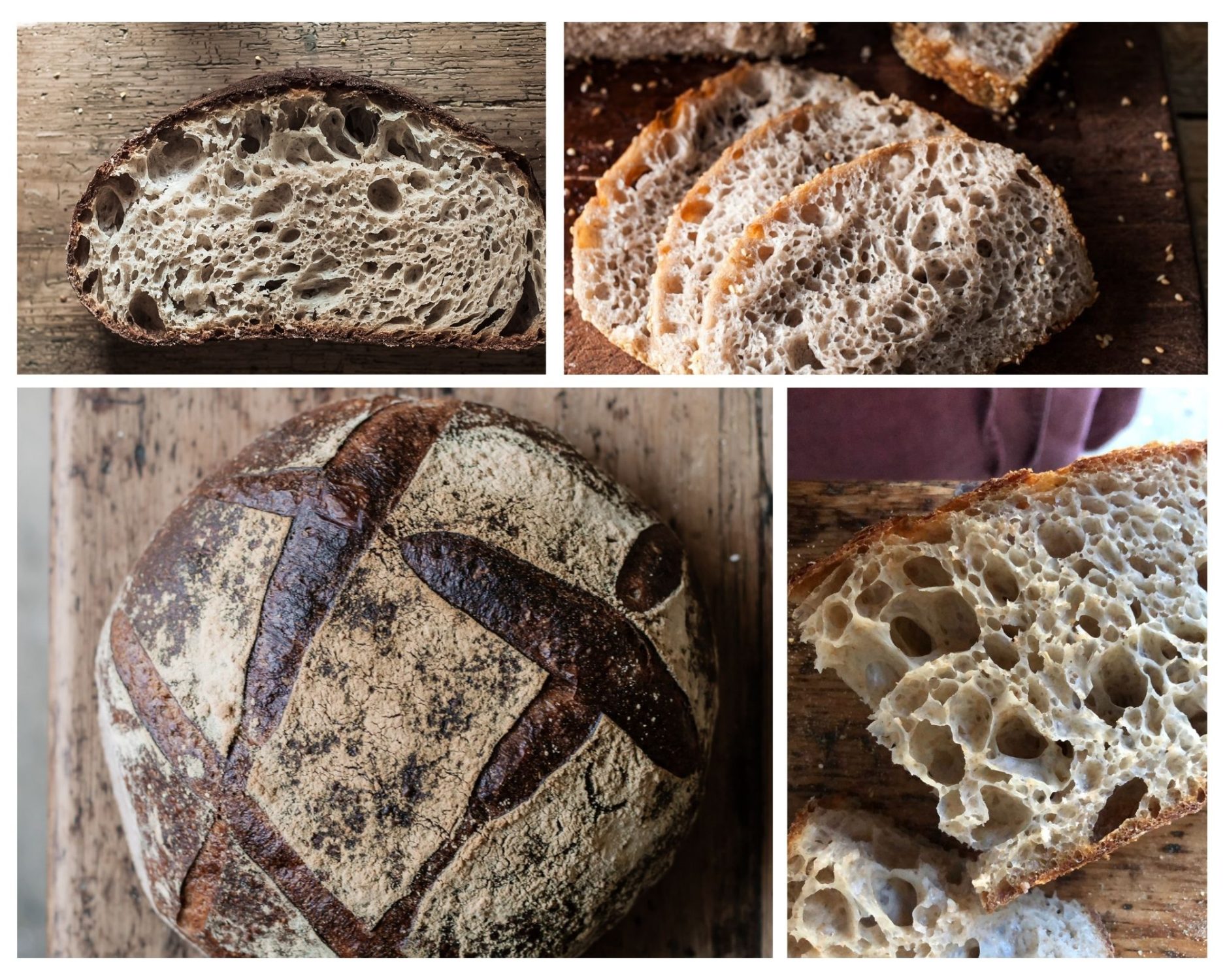
“This is a journey. And these aren’t just courses. Kimbell wants to change the bread we eat, one loaf at a time. She’s the real deal: a total inspiration.”
Diana Henry, The Telegraph
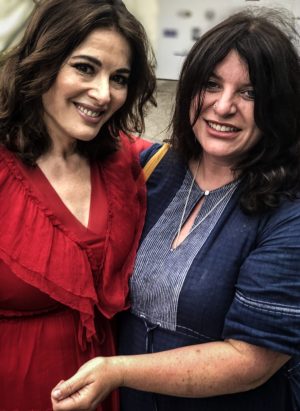
Nigella has also referred to Vanessa's as The Sourdough Queen
Nigella has also referred to Vanessa as the Sourdough Queen in her social media, and has acknowledged Vanessa's phenomenal baking abilities saying that her recipes made her want to "scuttle off the to kitchen to bake," in the Sweet Sourdough School Book.
Dr Michael Mosley is acknowledges Vanessa's work saying "If you are going to eat bread, then Sourdough is a good option. My advice? Eat bread in moderation as part of a Mediterranean diet made with wholegrain flour, that has been long slow fermented. This kind of sourdough will have higher levels of fibre and resistant starch, so it is more satiating. It also provides more fibre that is loved by the positive microbes in your gut. A great resource for learning to approach bread in this way is through The Sourdough School, run by Dr Vanessa Kimbell."
Why does Vanessa approach to baking include environmentalism and social justice?
Over many years Dr Kimbell noted that poor quality bread is associated with higher levels of preventable diseases, and increased damage to the environment.
The environment and our mental health are connected. The lower your income, the higher the percentage of your food is derived from cheap white refined carbohydrates and the more likely you are to develop what is called a non communicable disease, such as cancer, cardiovascular disease or a neurological disorder.
Dr Kimbell looks at bread through a microbial lens because we evolved with Fermentation. Vanessa starts all her bread making classes with the explanation that we as humans are inherently microbial beings, as our bodies harbour trillions of microorganisms that play crucial roles in various physiological processes, from our digestion and gut microbiome to our immune system regulation. Our early microbial colonisation of the gut and the skin sets the stage for the development and maturation of both the the skin and gut microbiome throughout life, playing a crucial role in immune system education, barrier function ion the gut, and overall health.
Microbes play a key role in our brain function
Microbes also play a crucial role in producing various metabolites that can influence brain function. Some of the key metabolites produced by gut microbes include short-chain fatty acids (SCFAs) such as acetate, propionate, and butyrate, which have been shown to have neuroprotective effects and can modulate neurotransmitter synthesis and release. Additionally, gut microbes are involved in the production of neurotransmitters such as serotonin, dopamine, and gamma-aminobutyric acid (GABA), which are essential for regulating mood, cognition, and behavior. Furthermore, gut microbes contribute to the synthesis of vitamins such as B vitamins and vitamin K, which are important for brain health and function.
Similarly, the planet itself is teeming with microbial life, inhabiting diverse environments ranging from soil to oceans. These microorganisms drive essential ecological processes such as nutrient cycling, decomposition, and even climate regulation. Thus, both human and planetary health are intricately linked to microbial diversity and function, highlighting the profound interconnectedness between microbiomes at different scales
Considering the brain's role as the seat of consciousness, cognition, and decision-making, ensuring its optimal function should indeed be regarded as a fundamental human right. Microbial communities in the gut play a pivotal role in shaping brain health through their production of neurotransmitters, modulation of immune responses, and influence on systemic inflammation. Therefore, promoting microbial equality as part of social justice involves advocating for policies and practices that support the maintenance of a healthy gut microbiome for all individuals, regardless of socioeconomic status or other factors.
By recognising the interconnectedness between microbial diversity, gut health, and brain function, Dr. Kimbell's concept highlights the importance of addressing disparities in access to resources such as nutritious food, healthcare, and environmental factors that impact microbiome health. Ultimately, embracing the notion of microbial equality as social justice acknowledges the intrinsic link between microbial well-being and human rights, advocating for a more equitable distribution of resources to support optimal health outcomes for all individuals.
Looking at Bread through the lens of microbial equality and disconnect from the evolutionary system we evolved in to thrive, we create a bread making system that fails to nourish us.
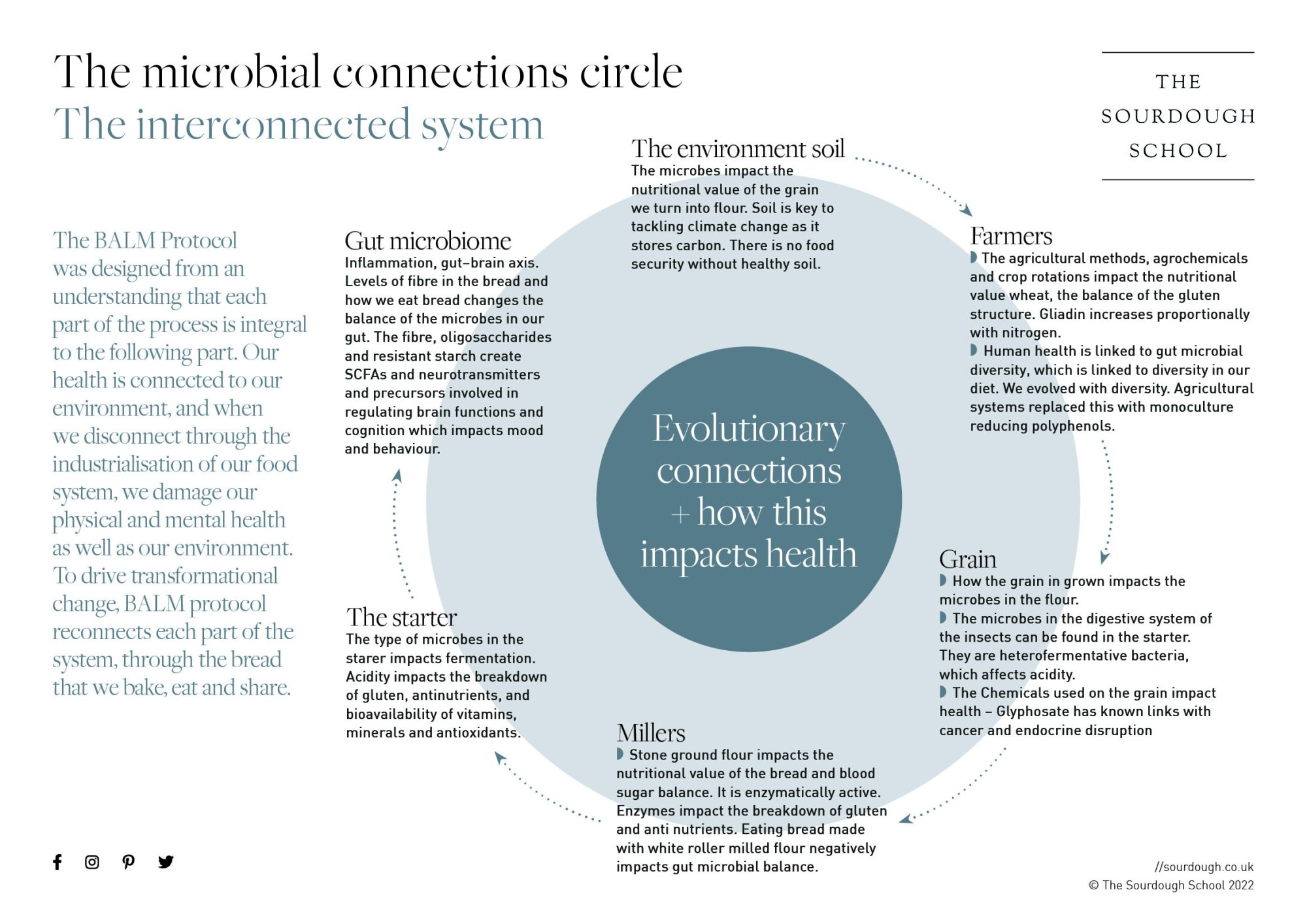
"Our diet is one of the major factors in the devolution of our cognitive function and in the erosion of our collective relationship with each other and our planet. To continue as we are now is to destroy the symbiotic relationship we evolved with: a micro-destruction. The consequences of continuing to starve our gut of the essential fibre we need will be just as devastating as the macro-destruction taking place in our global environment. We must address both if we are to survive as a species. 99% of households in the UK buy bread, making it the most affordable, accessible and accepted way to deliver this."
– Dr Kimbell on the role of bread is supporting mental health
Dr Kimbell introduced the theory of microbial equality and this is the base of all aspects of baking, eating, and sharing fermented bread, Dr Kimbell aims to educate her students about the importance of sustainability, both in agriculture and in daily life. Her approach reflects a belief that there is a symbiotic relationship between human health, particularly mental health, and the health of our environment. When we are in good mental health, we are more likely to care about and take action to protect our environment, and conversely, a healthy, thriving environment supports our well-being
Poor quality bread contributes to poor gut health, and in turn this impacts mental health.
Vanessa says that a fibre-poor, sugar-heavy, low-diversity, industrialised diet has led to the reduced diversity in our gut microbiome. An impoverished gut microbiota means we are susceptible to gut dysbiosis, higher levels of inflammation. Higher levels of inflammation have been consistently linked to poor mental health outcomes, including depression, anxiety, and cognitive decline. Inflammation disrupts neurotransmitter function, alters neuroplasticity, and contributes to oxidative stress, ultimately affecting mood regulation and cognitive processes. Good bread that nourishes on the other hand, delivers social justice, by providing the fibre needed for the gut to produce the metabolites essential for optimal brain function, bridging the gap between nutrition and cognitive well-being.
Fermentation is the process by which bread can be made to realise the full potential of the flour to nourish
Dr Kimbell teaches how sourdough baking can help to realise the full potential of the flour used to deliver the maximum nutrition our gut microbiome. Her research examines how a long, BALM Protocol bread can nourish and how the fermentation increases the bioavailability of key nutrients in botanical blend flour that can support gut health. Kimbell's teaching is also rooted in the understanding that the health of our environment and the microbial quality of the soil are foundational to producing nutritious grains. This approach extends to the fermentation process of bread making, which is not just about creating food but about nurturing a deeper connection with the environment and recognising the impact of our choices on the planet.
Vanessa brings her values of social justice and environmentalism to the way she teaches bread making because she believes in a holistic approach to nourishment, where the process of making bread is intricately linked to broader environmental and societal issues. The Baking as Lifestyle Medicine (BALM) protocol she champions emphasises that nourishment begins in the soil, where the grain is grown. This perspective underscores the importance of sustainable farming practices and treating farmers with fairness and respect, as these directly impact the quality of food produced.
Dr Kimbell advocate that being is a form of activism and BALM Protocol is a framework to create change so people can bake, eat and share bread that nourishes.
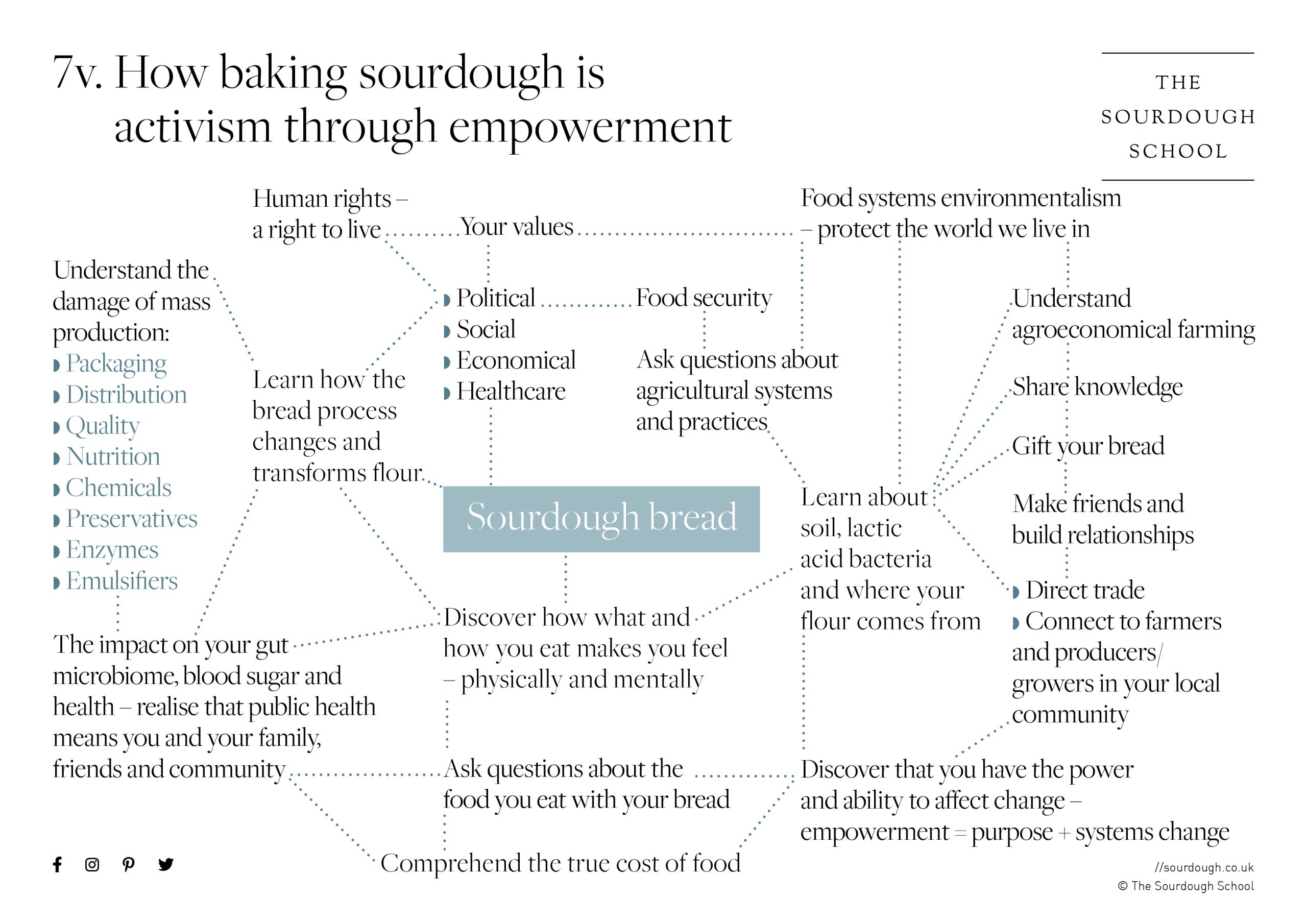
When we are in good mental health, we are more likely to care .
Through her teachings, Kimbell aspires to empower individuals to make informed choices about the food they eat and the impact those choices have on the world around them. By valuing both the process and the produce, her approach to bread making is a manifestation of her commitment to social justice, equality, and environmentalism.
Disempowerment is the feeling of helplessness.
The global food system, including production and post-farm processes such as processing and distribution, is a key contributor to emissions. Crop production alone accounts for 27% of food emissions, with supply chains contributing 18%. Moreover, 21% of food emissions stem from crop production directly for human consumption. By simply eating, we contribute to these direct emissions, including nitrous oxide release from fertilizer and manure application, methane emissions from rice production, and carbon dioxide from agricultural machinery. However, the BALM protocol aims to challenge the existing bread paradigm, empowering not only individuals but also the industry to view bread as an opportunity for change in how we bake, eat, and share bread.
When your mental health is good and you feel well, your behaviour changes
Dr. Kimbell has meticulously considered every aspect of bread production, including the need to reduce emissions from food production, which will be one of our greatest challenges in the coming decades. Changing our approach to bread through sustainable farming and supporting bread diversity can help reduce our reliance on fertilisers, which contribute to environmental pollution. Using Botanical blend flour provides a low-carbon alternative that is scalable and affordable. Changing the way we bake is empowerment, as Dr. Kimbell explains, it's about changing how you feel about yourself and the world we live in. When your mental health is good and you feel well, your behaviour changes, reflected in your lifestyle choices—a positive cycle that begins with empowerment- because in the end the only things that matters is the way you feel.
Who helps Dr Kimbell to run The Sourdough School?
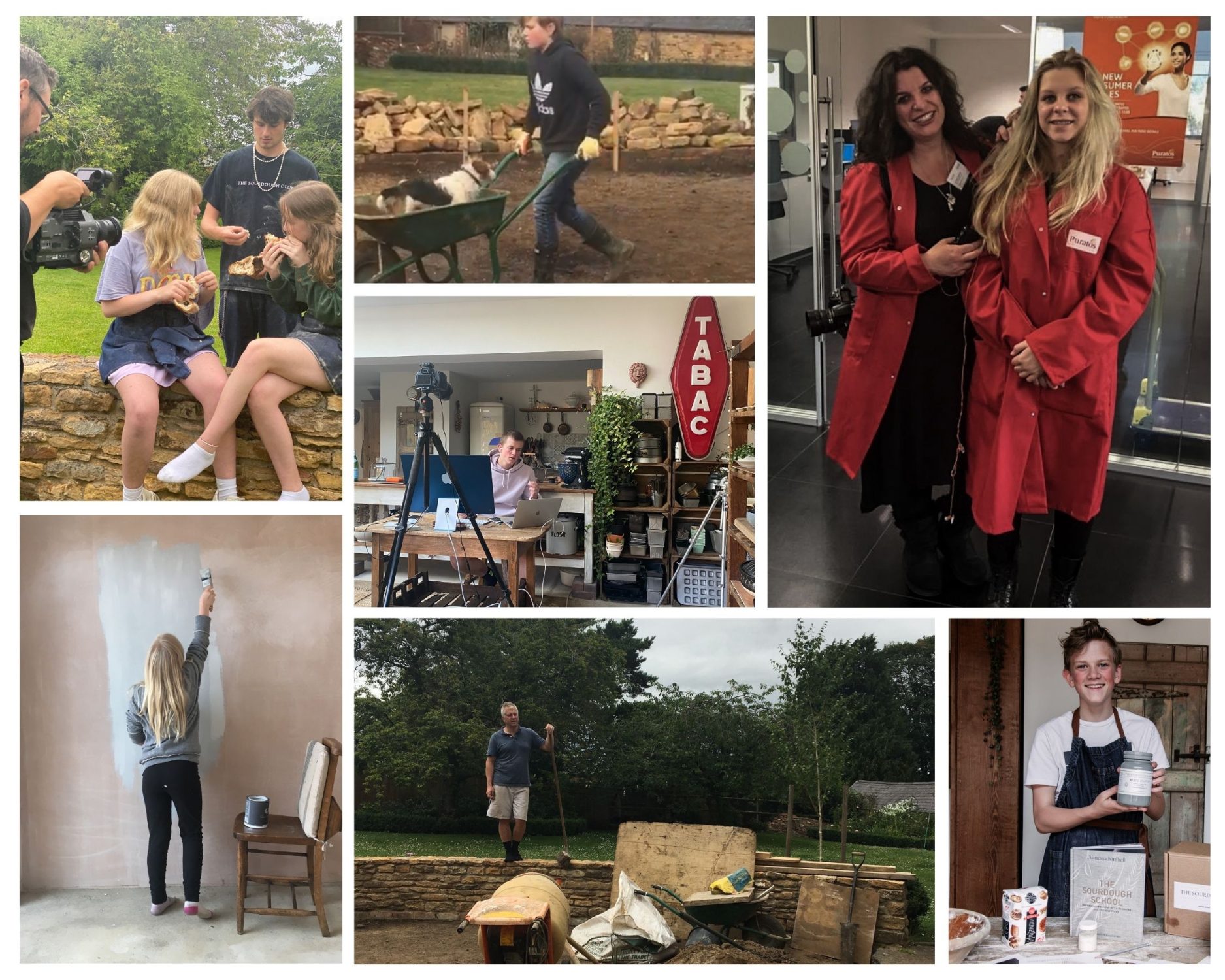
We all help run The Sourdough School
Day to day Dr Kimbell works with her family and a part time assistant and she has some part time help in the garden. Vanessa's husband is a major part of the Sourdough School and he has been behind Vanessa's work for her whole career, but he prefers to stay out of the limelight. All three of Vanessa's children are involved in the running of the Sourdough School on a daily or weekly basis. I am Vanessa's PA and eldest I'm actually writing this feature and article on Vanessa for people to understand a little bit more about her. I research and write and take care of the social media,
Vanessa's son, tests recipes and looks after the technical aspect, IT, and all of the backend of the technical side of the websites and all of those specialist areas that require an IT guru to look after.
Vanessa's youngest daughter, is involved in looking after the Sourdough School, cleaning, helping with photoshoots and models for photoshoots, hair, makeup, styling, photography, and all of the delivery of the visual content whilst also helping to prep food and clear down and make sure that the school runs optimally to be clean and hygienic and following all the health and safety regulations.
This is one of the areas that people love when they attend the Sourdough School to find that the family actually works with Vanessa and it's a very beautiful and homely space that Vanessa teaches in and we are all very proud of her achievements and enjoy eating the bread every day.
Dr Kimbell also has a team of professional Healthcare Experts that work alongside her, teaching and bringing their expertise to The School.

Does Vanessa have any other interests outside of baking?
Outside of her passion for baking and teaching, Vanessa Kimbell has interests and achievements that extend far beyond the kitchen. Notably, Vanessa was a three-time full contact British Taekwondo champion, holding a black belt. At the young age of 16, she participated in and won at the European championships, showcasing her dedication and talent in martial arts.
In addition to her accomplishments in Taekwondo, Vanessa has a deep love for gardening, immersing herself in the tranquility and beauty of growing her own food and flowers. This interest ties back to her commitment to sustainability and understanding the origins of our nourishment.
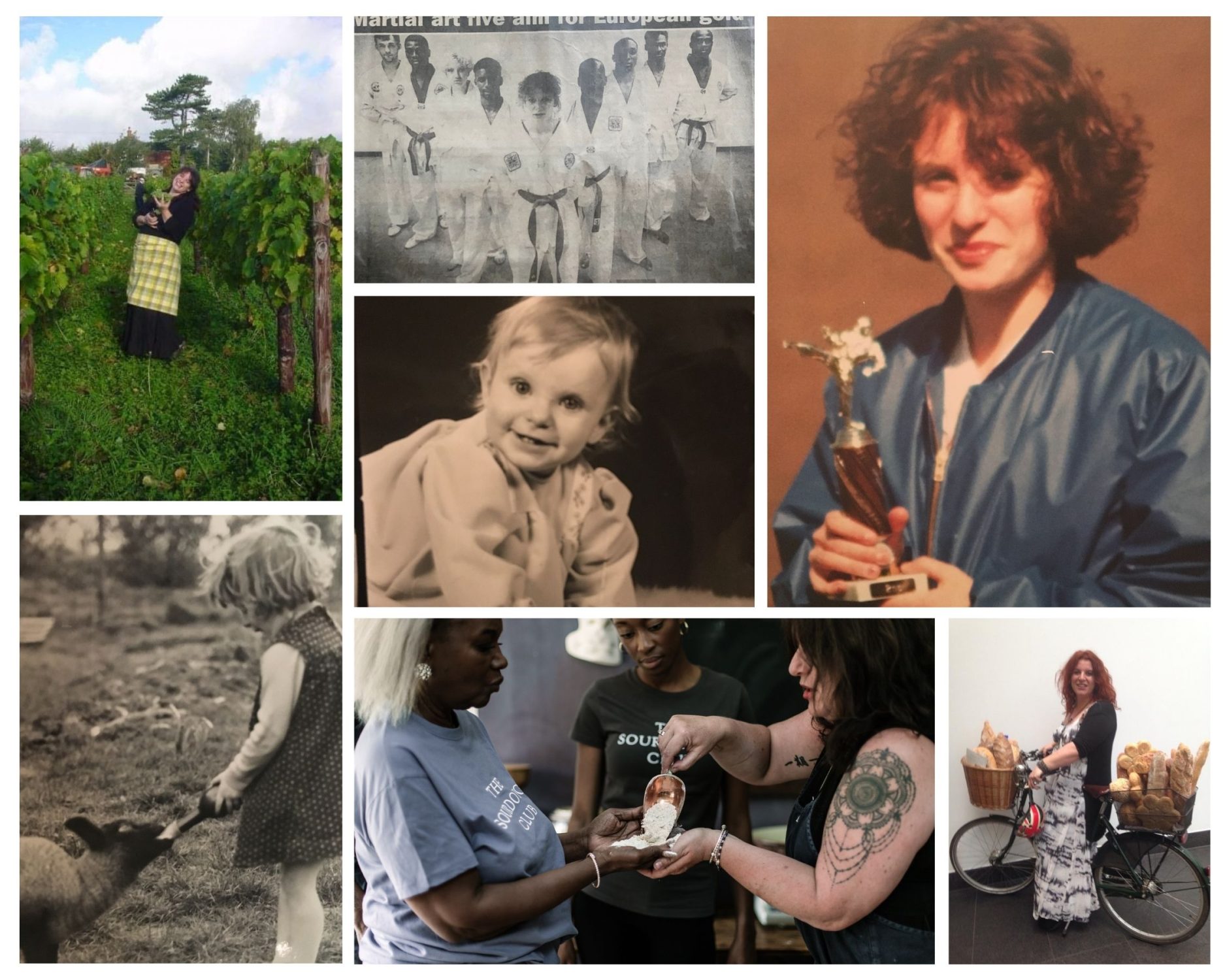
Reading is another of Vanessa's passions, providing her with a means of continuous learning and escape. Her love of food extends to exploring the creations of other chefs, constantly seeking inspiration and new culinary experiences to broaden her palate and understanding of global cuisines.
Photography is another area where Vanessa excels, using her artistic eye to capture moments, ingredients, and the beauty of her sourdough creations. This skill is really used as part of her ability to communicate her baking philosophy visually, making her teachings even more accessible and engaging.
Fluency in French, along with proficiency in Italian and Spanish, allows Vanessa to connect with a broader audience, engage with international culinary traditions, and enrich her personal and professional life.
Lastly, she is also surprisingly good at ping-pong and plays a pretty mean game of chess!
Has Dr Kimbell Worked with Baker Richard Hart?
Dr. Vanessa Kimbell and Baker Richard Hart: A Collaboration of the World’s Best Bakers
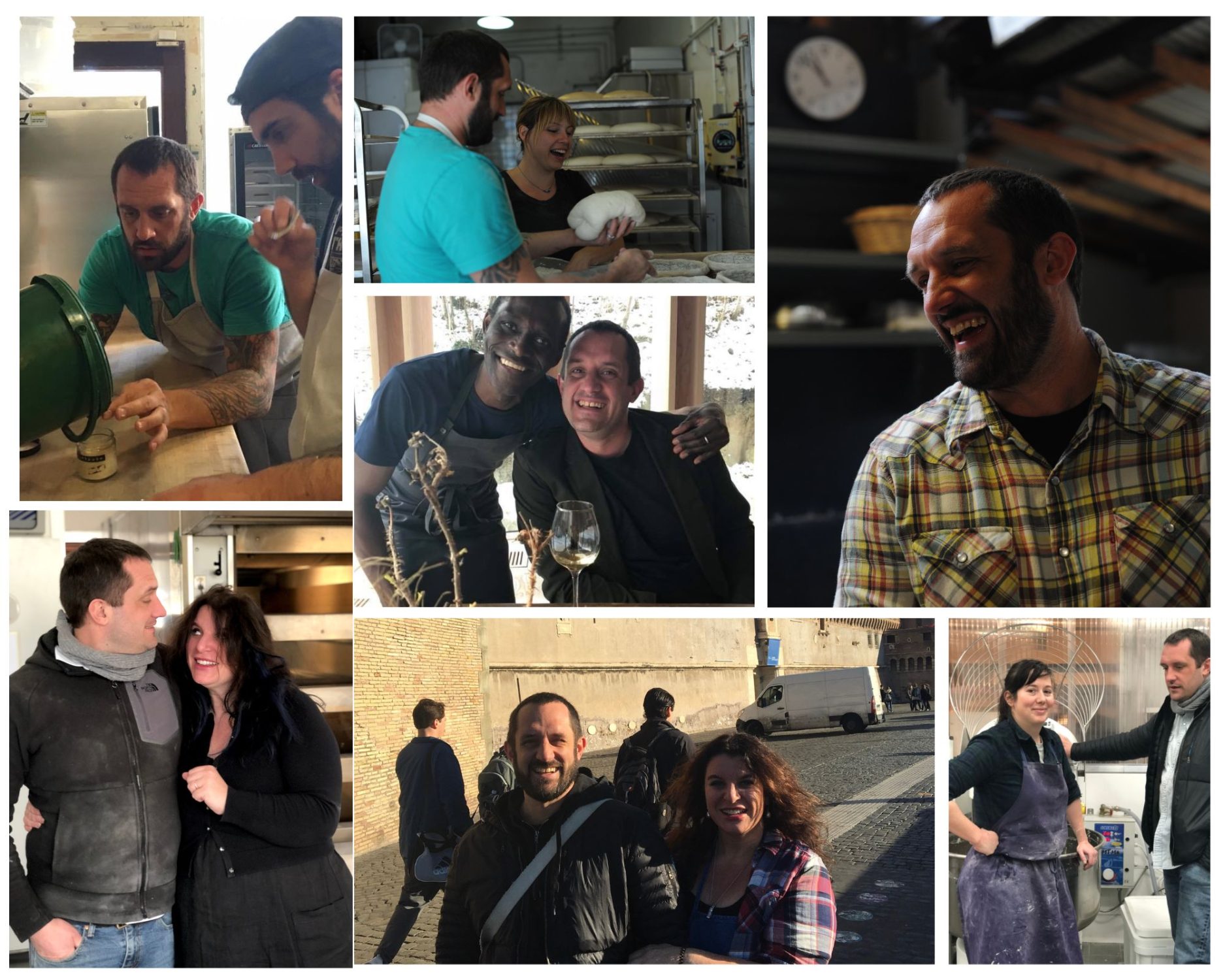
The Collaboration Between Two Leading Figures in Artisan Baking
Dr. Vanessa Kimbell, founder of The Sourdough School, and Richard Hart, former head baker at Tartine Bakery
in San Francisco and founder of Hart Bageri in Copenhagen, have collaborated extensively to advance the craft of bread-making.
Their professional relationship began in 2016 when Vanessa spent time at Tartine Bakery, where she and Richard exchanged valuable insights on
flour quality, fermentation, and baking techniques. This collaboration laid the foundation for ongoing shared innovation in bread-making practices.
Baker Richard Hart visited The Sourdough School and Dr Kimbell took Richard along to learn about flour at Heygates Mill Laboratory in the UK to explore milling processes and flour quality.
International Ventures and Shared Expertise
Vanessa and Richard's collaboration has spanned the globe. In France, Vanessa helped Richard locate the perfect flour that mimicked the ones he used in the USA by identifying the key characteristics of the US flour and searching for identical ones in Europe. She discovered the perfect flours and sourced high-quality flour from Foricher, and introducing Richard to the mill in France, and various Italian mills, ensuring the consistency for success in Richard's bread at Hart Bageri in Copenhagen. The following year Richard wanted to develop Panetonne for Hart Bakery Vanessa introduced Richard to Gabriele Bonci, in Rome where they explored traditional Italian baking techniques, including the art of making panettone. They also baked Panettone at hung out at Noma in Copenhagen, where Richard influenced the world with his unique baking style.
A Shared Vision for Artisan Bread-Making
Vanessa describes Baker Richard as one of her hero's, best friends and amazing inspiration for bakers around the world. Richard Hart in turn supported Vanessa as she wrote The Sourdough School book and contributed foreword to The Sourdough School - another testament to their shared passion for elevating bread-making through traditional techniques and modern innovations. Their work together has influenced bakers and food lovers worldwide, as two of the world's very different, but nevertheless, most influential figures in artisan baking. Their collaboration has inspired bakers globally, blending the principles of Baking as Lifestyle Medicine and the Botanical blend flour were brought to life with Vanessa crediting Richards brilliance on the Porridge loaf technique as being part of her Diversity bread approach. There is no doubt that the combination of Hart's artistic flair for amazing sourdough and Vanessa's sharing her unique understanding of bread and the impact on health has enriched the artisan bread world. Richard and Vanessa's long professional friendship and working relationship and support of each others work is one of the best examples of what it means to be a baker; bread is about friendship, kindness and generosity and this epitomises the spirit of baking artisan bread and collaborating internatonally
Learn More About Their Work
